06/06/18
K-State Current - June 6, 2018
K-State Current is a weekly news update for the Kansas Board of Regents to apprise the Regents on a few of the many successes and achievements made by K-State faculty, staff and students.
K-State News
From the Provost's desk: Endings and beginnings
Dear Colleagues:
Last August when I announced I would be leaving at the end of June 2018, it felt like I had so much time and would be able to do so many things in advance of my departure. At the New Student Convocation last August, I teared up thinking it was my last of these special events. However, I still had a whole year to get important work done.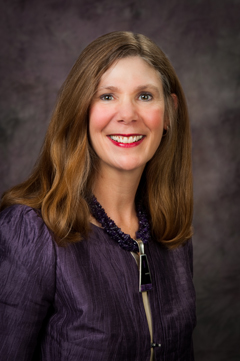
As you know, commencement is one of my very favorite ceremonies of the university. In December, I made many in Arts and Sciences laugh when I came to their commencement with a bicycle helmet under my motor board, just in case I decided to fall off the stage again! (BTW, many thanks to the Athletics staff who took my fall very seriously and reconfigured the stage. I guess they figured I was not the only graceless provost around!)
During this spring's commencement, I watched student after student walk across the commencement stage, and I thought of what each represented. Their individual efforts, trials, successes and failures. The help they had gained from so many. I had the opportunity to shake hands with each and congratulate them. I lost count of how many walked across with little ones in their arms. They were tattooed, pierced, wore high heels, or flip-flops, dressed to the tees or looking like they had just thrown a robe on over their sleepwear, they all processed, they moved their tassel from the right to left and the crowds cheered. There were two posthumous diplomas given, painful reminders of those who were here, but are no longer with us.
Speeches abounded, including ones by President Myers, First Lady Mary Jo Myers and myself. I do not remember the speaker at my college graduation, so harbor no hope anyone will remember my words, but it was uplifting to challenge the Human Ecology graduates to accept the gift of education they had worked for and received. I asked them to keep learning always by asking questions, reading, thinking, experiencing new things, and being uncomfortable.
After the students moved out of the residence halls, I moved in. My home until late June is a Kramer apartment. Very nice and made available by Housing and Dining. My sincere thanks. It seems fitting, as when I came to K-State I lived temporarily in the condos at Anderson and Manhattan. I walked to the office and felt the campus. I do so again. Trenton Kennedy, graduating senior, posted on Facebook a video of campus as he drove through on his way out of town after graduation. It was touching. As I run (jog slowly) around campus in the early morning, I am composing my own video of the sights, sounds, memories, events, and thoughts of my tenure here at Kansas State University. The video is long, it has hilariously funny times, poignant times, sad times and deeply studied times. The university is different than it was in 2010 when I arrived, much has moved forward on our way to 2025. Much is better, much needs yet to be done.
I am different than when I arrived in 2010. I have been shaped by the many incredible students, staff and faculty I have had the honor to know, work with, and be inspired by. I am thankful and honored to have had the opportunity to serve Kansas State University. The wheel of the academic year will continue to turn, new students will come, and more students will graduate. New faculty and staff will choose Kansas State for their careers. I will look on fondly from an adjacent state and always smile. Thank you for sharing your university with me. I am not done, but my time here has nearly run out. I know there are so many who will continue the great work of teaching, research and service at the core of an outstanding land-grant university.
Thank you for all you do,
April
Experienced administrator, educator next provost of Kansas State University
Charles Taber, the vice provost for graduate and professional education and dean of the Graduate School at Stony Brook University, New York, has been named the new provost and executive vice president of Kansas State University.
Taber's appointment was announced by Richard Myers, university president. He will assume his new duties on Aug. 15. 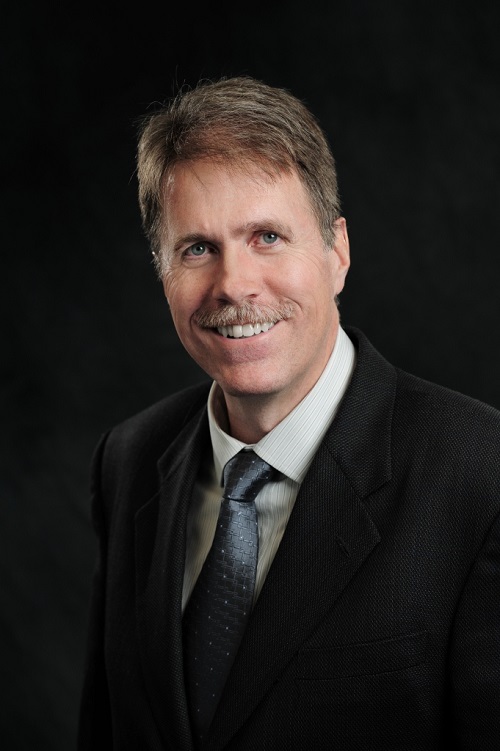
"Charles Taber is ideally qualified to become the next provost and executive vice president of Kansas State University," Myers said. "Along with his extensive academic leadership and teaching experience, Dr. Taber brings expertise on two major initiatives facing Kansas State University: strategic enrollment management and budget modernization."
Taber will play an essential role in the implementation of both initiatives as the university works to stabilize and build enrollment and adopt a new budget model to better address the many funding challenges facing higher education. As the higher education landscape continues to evolve, he will address and identify opportunities to advance K-State's land-grant mission.
"I am excited to be joining the K-State family, especially because of the strong commitment to community," Taber said. "It's easy to see why K-State has been on such a positive trajectory. I am looking forward to working with the leadership team, faculty, staff, and students to tackle our remaining challenges and opportunities. The future is bright at K-State and I am thrilled to be part of it!"
As the university's chief academic officer, Taber will report directly to Myers, serving as a close advisor and strategic leader on all aspects of university governance and the academic enterprise. He also will serve as the university's chief executive officer in the president's absence.
Taber will provide strategic oversight for academic planning, resource allocation and innovation in all academic programs while ensuring excellence and relevance in the design of the curriculum. He will focus on the quality of teaching and learning; providing global perspective and strategic direction to successfully manage operating budgets; and enhance the quality of the student experience at all levels.
Taber has served in his current position since 2013. He joined Stony Brook in 1989 as an instructor of political science, earning a promotion to full professor in 2008. He has served in many administrative positions at the university, including associate dean for postdoctoral affairs, dean of the School of Professional Development and interim provost and senior vice president for academic affairs. At Stony Brook, he has been involved with graduate enrollment management and addressing budget challenges in higher education.
A leading scholar in the fields of political psychology and computational modeling, Taber has more than 50 scholarly publications. His work has earned millions of dollars in grant funding from the National Science Foundation. His research has contributed to the growing literature on the psychological mechanisms that drive public opinion. In 2000, he received the Paul Lazersfeld outstanding paper award from the American Political Science Association for a paper on the causes of bias in political reasoning, published in the American Journal of Political Science. Along with Milton Lodge, Taber developed an influential theory of unconscious thinking in political behavior. Their 2013 book, "The Rationalizing Voter," from Cambridge University Press, won the Robert E. Lane Book Award and the Book of the Year Awards from the Experimental Politics and Migration and Citizenship Sections of the American Political Science Association.
His teaching and research interests include diversity in higher education, budgeting in higher education, political psychology, public opinion and international relations. Taber earned his doctorate and master's degree in political science from the University of Illinois, Urbana-Champaign and a bachelor's degree in political science from East Tennessee State University.
Taber replaces April Mason, who is leaving the university at the end of June after serving as provost and senior vice president since 2010.
A letter from President Richard Myers
Dear K-Staters,
Yesterday, we had our first walk-through of Hale Library since the fire. While there was plenty of smoke and water damage, I saw an opportunity for our university to build a stronger future.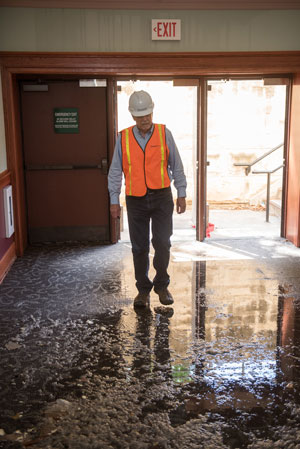
Our land-grant ethos requires that we take setbacks in stride and continue to strive for growth and progress. The fire in Hale Library brought out the best in our family and community. City, county, state, military and other agencies had our backs, with firefighting, emergency management and support. A common theme from those who were on the scene was the remarkable cooperation by folks from 17 different organizations.
Together, they saved our library, the heart and soul of our university. Academics, student life, research and social interaction all converge in the heart of campus. Thank you to those who responded to save our historical building and its priceless contents.
Even now, there are countless teams working to bring us back to full operational status. Our friends at the University of Kansas have been especially helpful with data recovery. We appreciate everyone's patience, be assured we will come back stronger than ever. Every event has lessons for the future; we can take many from this fire.
Helping students is our top priority. All current and future students may call 785-532-1521 to discuss any concerns or questions with our student life staff. We also have set up a frequently asked questions website in addition to the update webpage.
Because this university and its people are resilient, I know we will continue to work hard to restore Hale Library to its full glory and be ready for students this fall.
Go Cats!
Richard B. Myers
President
Best College Reviews, which annually ranks the top academic degrees and programs, puts Kansas State University's programs No. 1 on its list of the top 25 best online master's degree programs in engineering for 2018.
The university's programs earned the top spot based on tuition, their customizable options within degree program, and their "wow" factor, which highlights each program's unique offerings that set it apart from the pack.
Offered in partnership with K-State Global Campus, the College of Engineering has nine online master's degrees available to students: mechanical engineering, nuclear engineering, industrial engineering, electrical and computer engineering, chemical engineering, civil engineering, software engineering, engineering management and operations research.
The programs are offered fully online and allow students to continue to work and live anywhere.
"Earning the top spot on this list reflects the overall value our students in these programs enjoy as they come back to school for an advanced degree, and this ranking recognizes the outstanding reputation for excellence of our online engineering programs," said Long Huynh, associate dean for enrollment management and marketing at K-State Global Campus.
More information on the program is available at global.k-state.edu/engineering.
K-State Faculty Highlights
Stefan Bossmann named one of the 50 Kansans You Should Know
Stefan Bossmann, professor of chemistry, has been named one of the 50 Kansans You Should Know for 2018 by Ingram's Magazine.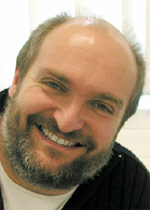
The 50 Kansans You Should Know honors high-achieving Kansans. The selection criteria include having a strong reputation as a leader in Kansas, unique interests beyond their normal work, a strong character and high-level integrity.
Bossmann has served on the faculty in the chemistry department since fall 2004. Through his efforts in teaching, service and research, he has made many vital and lasting contributions to the department's educational and research programs.
Bossmann is a popular lecturer and teaches a broad range of courses in organic chemistry at the graduate and undergraduate levels. His research program primarily emphasizes the development of nanomaterials for disease detection and treatment. He and his collaborators and coworkers are motivated by the need for new methods to detect breast, lung and pancreatic cancers at very early stages.
He has published approximately 200 scientific manuscripts to date, he holds 11 active patents and has attracted significant funding from federal agencies.
Bossmann has mentored approximately 75 graduate students, postdocs and undergraduate researchers working in his labs. His co-workers, collaborators and students see him as an outstanding researcher, colleague, mentor and leader.
Phebus named to national food safety committee
Randall Phebus, professor of food safety and interim director of K-State's Food Science Institute, has been appointed by U.S. Secretary of Agriculture Sonny Perdue to a second consecutive two-year term on the National Advisory Committee on Meat and Poultry Inspection.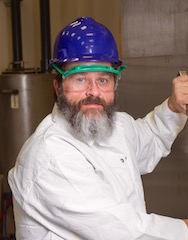
This committee, established in 1971 with authorization by the Federal Meat Inspection Act, advises the secretary on matters affecting federal and state inspection program activities, particularly on food safety policies that will contribute to the United States Department of Agriculture's regulatory policy development relating to meat, poultry and processed egg products.
Joining Phebus on the committee is Manpreet Singh, former graduate student in Phebus' laboratory and now a professor of poultry science at the University of Georgia.
K-State Student News
Kansas State University student from Athol among 2018 Cargill Global Scholars
A Kansas State University sophomore has been named a 2018 Cargill Global Scholar.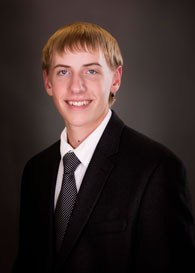
Jayden Meyer, sophomore in agricultural economics, Athol, is one of 10 U.S. students selected as a global scholar. The U.S. scholars join more than 60 scholars from Brazil, China, India, Indonesia and Russia.
As high-performing first- or second-year university students, Cargill Global Scholars study in fields that relate to Cargill's business goal of providing innovative solutions to meet today's economic, environmental and social challenges. The scholar program, administered by the Institute of International Education, provides students with tools to become global leaders and decision-makers.
Meyer will receive annual scholarships for up to two years, attend a three-day leadership seminar with other U.S. scholars in Minneapolis in June, and attend Cargill's global leadership seminar with Cargill executives and scholars from around the world. In addition, a Cargill mentor will help him with his academic and professional goals.
"Attending in-country and global leadership seminars will allow me to network with other students from around the world and learn about agriculture in other parts of the world, as well as gain valuable leadership skills that I can apply to my career," Meyer said "By helping fund my college education, the Cargill Global Scholars Program will be a huge boost for me in making a difference in the lives of others by following my dream of farming and growing food for the world."
Meyer is a member of the Wheat State Agronomy Club, Ag Econ and Agribusiness Club, Collegiate Farm Bureau, Student Mobilization at K-State and the University Honors Program. He also has received a Putnam Scholarship, Dane G. Hansen Leaders of Tomorrow Scholarship, Otis and Mary Lee Molz Cooperative, R.D. and Joan Dale Hubbard Scholarship, and a Toyota Financial Services Making Life Easier Scholarship.
A graduate of Smith Center High School, Meyer is the son of Jeffrey and Dawn Meyer, Athol.
K-State Crops Team completes successful spring season

Kansas State University 2018 Spring Crops Judging Team (left to right): Sarah Zerger, Nate Dick, Nicole Sudbeck, Chris Weber, Keren Duerksen, Tyler Marr, Kaylin Fink, Trent Frye, Katie Fross. Not pictured: Coach Kevin Donnelly
The Kansas State University Crops Team completed the spring season at the North American Colleges and Teachers of Agriculture (NACTA) Judging Conference held recently at Northeast Community College in Norfolk, Nebraska. The K-State team placed second to Iowa State University. A total of 25 crops teams competed, 17 in the four-year division and eight in the two-year division.
Nicole Sudbeck, K-State senior in agronomy from Seneca, led the team with a second place overall finish. Additional team members were agronomy majors Chris Weber, senior from Hoxie, Keren Duerksen, junior from Newton, and Sarah Zerger, senior from Cheney. Alternates were Nate Dick, sophomore from Inman, Kaylin Fink, junior from Chapman, Trent Frye, senior from Belleville, Tyler Marr, senior from Formosa, Rebecca Zach, sophomore from Morrowville, and Katie Fross, freshman from Hays. Kevin Donnelly, professor of agronomy, served as coach for the team.
The NACTA Judging Conference event was the last spring competition for the K-State team. Earlier in the season, the team placed first in the Panhandle State Invitational contest in February at Goodwell, Oklahoma, and first in the KACTA Regional Contest held at K-State in March.
The crops contest consists of four divisions: laboratory practical, agronomic exam, math practical and plant and seed identification. In the laboratory practical, competitors identify insects, diseases, crop products, and equipment, plus determine crop growth stages, interpret pesticide labels or seed tags, name plant structures, identify nutrient deficiencies, and evaluate various crop production problems. The agronomic exam evaluated knowledge of crop production and management, crop physiology and breeding, soil properties, soil fertility, tillage, crop harvesting and storage, weeds, insects and diseases. The math practical includes equipment calibration and various agronomic calculations. Seed and plant identification requires contestants to learn more than 250 plant and seed samples.
The crops team was one of 10 K-State agriculture interest area teams competing in the 2018 NACTA Judging Conference. K-State was named reserve champion in the sweepstakes award competition for overall placing across all events.